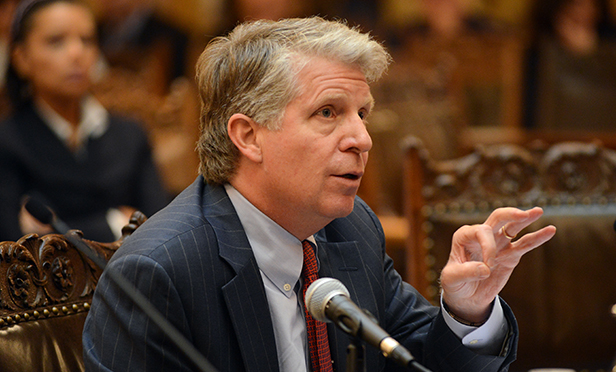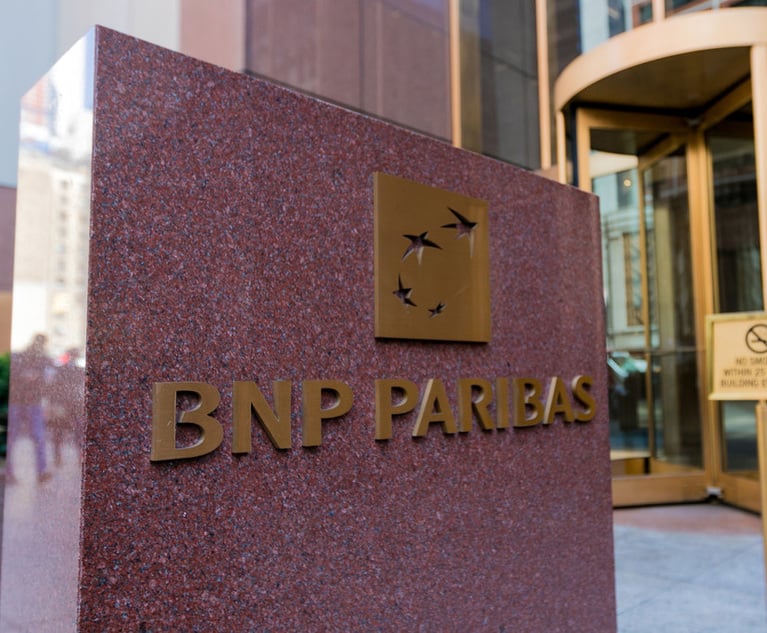In Abacus Case, Why Did Vance Prosecute?
Although not winning an Oscar for the Frontline documentary film about Abacus Bank's prosecution by D.A. Vance, the David & Goliath story of a neighborhood Chinese immigrant bank's successful defense of questionable charges brought by D.A. Vance's powerful office remains compelling.
March 06, 2018 at 02:05 PM
2 minute read

Although not winning an Oscar for the Frontline documentary film about Abacus Bank's prosecution by D.A. Vance, the David & Goliath story of a neighborhood Chinese immigrant bank's successful defense of questionable charges brought by D.A. Vance's powerful office remains compelling. Vance, given an opportunity in the film to present justification for his prosecution (really persecution), tries to make the case by analogizing someone who takes $5 from a lender and then returning $10 including interest in accordance with a loan agreement. This the vaulted D.A. calls larceny, because the documents prepared by the simple borrower are found lacking in some unimportant detail. One questions the decision to prosecute since there was no evidence of intent to cheat nor any losses were incurred by the lender.
Although all of the dozens of counts charged were either dismissed by the judge or denied by the jury, which finding Abacus entirely not guilty, the D.A, ignoring the presumption of innocence, insists that Abacus was not found innocent but only not guilty. Vance, you may recall, suffered other embarrassment when it was disclosed before the election that he had accepted $50,000 for his campaign from movie producer Harvey Weinstein's lawyers and of course failed to press sex offense charges against him. Weinstein was also the subject of a recent Frontline documentary film.
To his credit, Vance submitted this ethical question to a Columbia Law School body and in January announced a policy of no longer accepting contributions from lawyers whose clients are subject to prosecution by his office. It seems a first-year law student, even before attending an ethics class, would realize the appearance of impropriety his actions presented, again demonstrating a lack of basic prosecutorial judgment.
Lewis Rosenberg is of counsel
to Ginarte Gallardo Gonzalez Winograd.
This content has been archived. It is available through our partners, LexisNexis® and Bloomberg Law.
To view this content, please continue to their sites.
Not a Lexis Subscriber?
Subscribe Now
Not a Bloomberg Law Subscriber?
Subscribe Now
NOT FOR REPRINT
© 2025 ALM Global, LLC, All Rights Reserved. Request academic re-use from www.copyright.com. All other uses, submit a request to [email protected]. For more information visit Asset & Logo Licensing.
You Might Like
View All
'Merciless' Filing Deadline Dooms Cuban Americans' Property-Trafficking Suit Against BNP Paribas, SocGen
4 minute read
After 2024's Regulatory Tsunami, Financial Services Firms Hope Storm Clouds Break


Trump Mulls Big Changes to Banking Regulation, Unsettling the Industry
Trending Stories
- 1'It's Not Going to Be Pretty': PayPal, Capital One Face Novel Class Actions Over 'Poaching' Commissions Owed Influencers
- 211th Circuit Rejects Trump's Emergency Request as DOJ Prepares to Release Special Counsel's Final Report
- 3Supreme Court Takes Up Challenge to ACA Task Force
- 4'Tragedy of Unspeakable Proportions:' Could Edison, DWP, Face Lawsuits Over LA Wildfires?
- 5Meta Pulls Plug on DEI Programs
Who Got The Work
Michael G. Bongiorno, Andrew Scott Dulberg and Elizabeth E. Driscoll from Wilmer Cutler Pickering Hale and Dorr have stepped in to represent Symbotic Inc., an A.I.-enabled technology platform that focuses on increasing supply chain efficiency, and other defendants in a pending shareholder derivative lawsuit. The case, filed Oct. 2 in Massachusetts District Court by the Brown Law Firm on behalf of Stephen Austen, accuses certain officers and directors of misleading investors in regard to Symbotic's potential for margin growth by failing to disclose that the company was not equipped to timely deploy its systems or manage expenses through project delays. The case, assigned to U.S. District Judge Nathaniel M. Gorton, is 1:24-cv-12522, Austen v. Cohen et al.
Who Got The Work
Edmund Polubinski and Marie Killmond of Davis Polk & Wardwell have entered appearances for data platform software development company MongoDB and other defendants in a pending shareholder derivative lawsuit. The action, filed Oct. 7 in New York Southern District Court by the Brown Law Firm, accuses the company's directors and/or officers of falsely expressing confidence in the company’s restructuring of its sales incentive plan and downplaying the severity of decreases in its upfront commitments. The case is 1:24-cv-07594, Roy v. Ittycheria et al.
Who Got The Work
Amy O. Bruchs and Kurt F. Ellison of Michael Best & Friedrich have entered appearances for Epic Systems Corp. in a pending employment discrimination lawsuit. The suit was filed Sept. 7 in Wisconsin Western District Court by Levine Eisberner LLC and Siri & Glimstad on behalf of a project manager who claims that he was wrongfully terminated after applying for a religious exemption to the defendant's COVID-19 vaccine mandate. The case, assigned to U.S. Magistrate Judge Anita Marie Boor, is 3:24-cv-00630, Secker, Nathan v. Epic Systems Corporation.
Who Got The Work
David X. Sullivan, Thomas J. Finn and Gregory A. Hall from McCarter & English have entered appearances for Sunrun Installation Services in a pending civil rights lawsuit. The complaint was filed Sept. 4 in Connecticut District Court by attorney Robert M. Berke on behalf of former employee George Edward Steins, who was arrested and charged with employing an unregistered home improvement salesperson. The complaint alleges that had Sunrun informed the Connecticut Department of Consumer Protection that the plaintiff's employment had ended in 2017 and that he no longer held Sunrun's home improvement contractor license, he would not have been hit with charges, which were dismissed in May 2024. The case, assigned to U.S. District Judge Jeffrey A. Meyer, is 3:24-cv-01423, Steins v. Sunrun, Inc. et al.
Who Got The Work
Greenberg Traurig shareholder Joshua L. Raskin has entered an appearance for boohoo.com UK Ltd. in a pending patent infringement lawsuit. The suit, filed Sept. 3 in Texas Eastern District Court by Rozier Hardt McDonough on behalf of Alto Dynamics, asserts five patents related to an online shopping platform. The case, assigned to U.S. District Judge Rodney Gilstrap, is 2:24-cv-00719, Alto Dynamics, LLC v. boohoo.com UK Limited.
Featured Firms
Law Offices of Gary Martin Hays & Associates, P.C.
(470) 294-1674
Law Offices of Mark E. Salomone
(857) 444-6468
Smith & Hassler
(713) 739-1250






